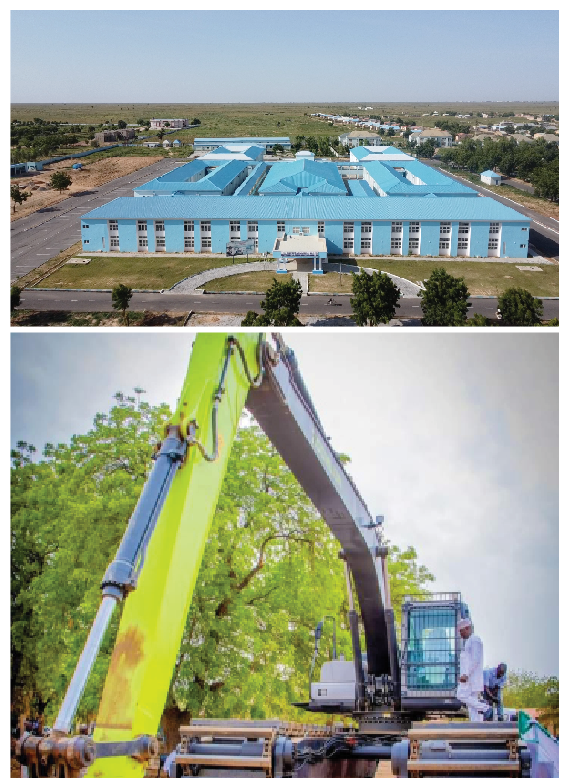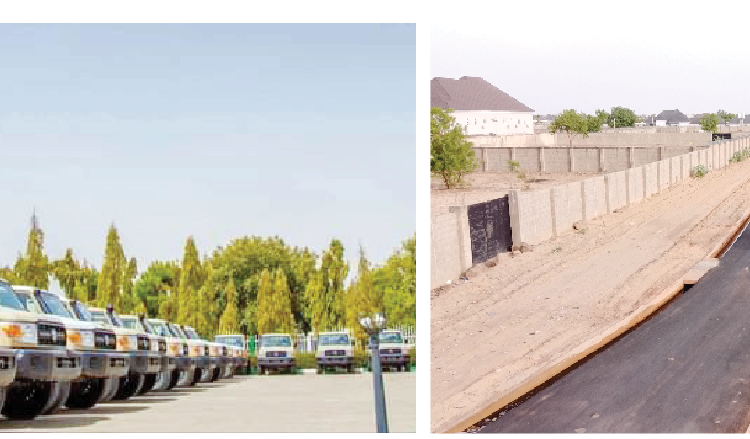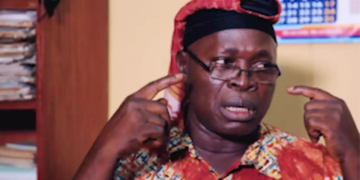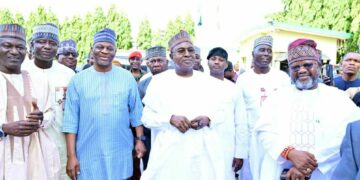The Yobe State governor Hon Mai Mala Buni said his administration’s decision to invest heavily in security, Education and Healthcare delivery among others were done in order to enhance the post insurgency recovery process after a decade long insurgency in the northeast.
Buni, represented by the secretary to the State Government, Alhaji Baba Mallam Wali stated this during a press briefing to mark his five years in office at the Governor’s Office in Damaturu the Yobe State capital.
The governor stated that as a government sworn-in with the mandate to improve the healthcare, education, economy among other basic amenities destroyed by the activities of the Boko Haram insurgents, his administration decided to not only invest in the sector but confront the challenges through a forward-thinking approach for better results.
 He said the decision to face challenges of reconstruction, resettlement and rehabilitation of communities among other developmental initiatives through a painstaking approach were necessary taking into consideration the support and belief of the people in his administration.
He said the decision to face challenges of reconstruction, resettlement and rehabilitation of communities among other developmental initiatives through a painstaking approach were necessary taking into consideration the support and belief of the people in his administration.
“As most of us here may recall when we took over the mantle of leadership on 29th May, 2019, there were many communities that remained inaccessible due to the threat posed by the insurgents in Gujba and Gulani Local Government Areas.
“With our commitment backed by the Federal Government, gallantry of the security operatives, complementary efforts of the vigilante groups and the persistent prayers of our people, normalcy has returned to the insurgency most-ravaged areas and reconstruction, resettlement and rehabilitation of communities e.g Buni-yadi have been developed while that of Malamdunari is being carried out satisfactorily at present. In almost all parts of the State, people are now moving about pursuing their legitimate goals without hindrance.
“You may recall during my inaugural speeches in 2019 and 2023, I informed Yobeans of our commitment to the provision of functional and standard primary healthcare system at ward level, secondary healthcare system at Local Government headquarters, specialist care at zonal levels and tertiary care in the State capital with the aim of achieving universal health coverage throughout the State.
“To achieve our target of providing one functional primary healthcare center in each of the 178 Electoral wards of the State, so far 140 have been completed and commissioned. We have also procured and launched 88 customized tricycle ambulances and distributed them to the remote areas to ease movement of patients to the health centers.
“The Yobe State Contributory Healthcare Management Agency (YSCHMA) was established and over 300,000 people including civil servants and other members of the general public have enrolled in the scheme.
“The scheme enables patients to pay only 10% of the total cost of medication. The Yobe State Drugs and Medical Consumable Management Agency (YODMA) was also established with a total drugs worth over N2.3 Billion to address drugs and medical supply system needs of the State,” Buni explained.
The governor also stated that his administration has in the last five years succeeded in the provision of infrastructure, teaching and learning materials as well as teachers for the primary and secondary schools while tertiary institutions receive the required attention for better progress.
“The education sector was worst-hit during the period of insurgency as the dogma of the insurgents prohibited western education. Their attacks were seriously on school structures, teachers and students.
“The killings, maiming, trauma and the structural destruction were too enormous for us to contend with. This necessitated us to immediately declare a state of emergency on education.
“This was followed by the convening of the Education Summit, constitution of Committee on Revitalization of Basic and Secondary Education and later on, Yobe State Education Trust Fund.
“In this regard, we have been able to establish six new Model Schools, seven Mega Schools, nine new Government Girls Day Senior Secondary Schools, eight new Co-education Government Day Senior Secondary Schools and additional one for boys across the State.
“One IDP School was also established in Buni Yadi. All these were in addition to construction of new classes, laboratories, ICT centers, hostels and other vital structures as well as provision of teaching and learning materials to primary, secondary and tertiary institutions of learning for the attainment of conducive learning atmosphere for our students and pupils.
“Over 4,000 teaching and non-teaching staff were recruited and posted to various primary and secondary schools, and 26,000 teachers were trained or retrained to enhance their capacities.
“Through sustained school feeding programmes and prompt payment of counterpart obligation as well as school, tuition and examination fees for our candidates studying nationwide and abroad, we have been able to achieve massive increase in school enrolment and pursuance of education at all levels. The Tsangaya schools were also integrated into the system with a view to having all segments of our teaching and learning process on a common focus.”
Buni equally stated that his administration was able to resuscitate moribund industries in addition to the construction of five new modern markets three of which are completed and commissioned.
“In our continuous efforts to boost commerce and promote industrialization, we have reactivated the Sahel Aluminum Company, Yobe Flour and Feed Mills Company and Pre-stressed Concrete Pole Company.
“We have so far completed and commissioned the Ibrahim Geidam Ultra Modern Market, Damaturu; Senator Ahmed I. Lawan Modern Market, Gashua and the Sheikh Ngibirima Ultra Modern Market, Nguru while construction works are ongoing in Geidam and Potiskum Markets.
“Furthermore, construction of Potiskum Truck Transit Park and Mega Shopping Mall in Damaturu are ongoing also. Being the State with the largest production of high quality Sesame seeds, we are making efforts to complete the establishment of 3 Sesame Seeds processing factories in Damaturu, Nguru and Machina towns.”





